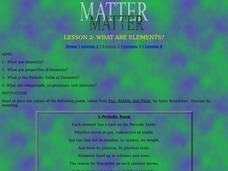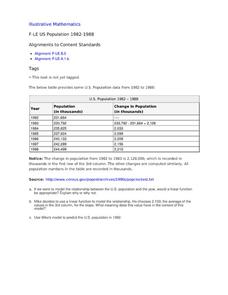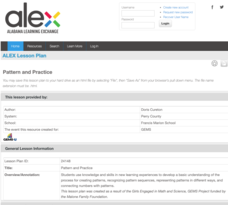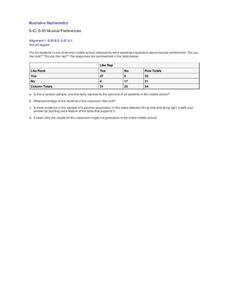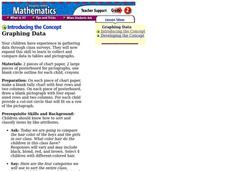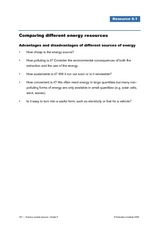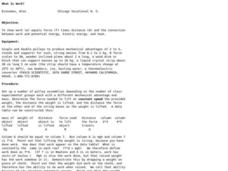EngageNY
Summarizing Bivariate Categorical Data in a Two-Way Table
Be sure to look both ways when making a two-way table. In the lesson, scholars learn to create two-way tables to display bivariate data. They calculate relative frequencies to answer questions of interest in the 14th part of the series.
EngageNY
Calculating Conditional Probabilities and Evaluating Independence Using Two-Way Tables (part 1)
Being a statistician means never having to say you're certain! Learners develop two-way frequency tables and calculate conditional and independent probabilities. They understand probability as a method of making a prediction.
5280 Math
Multiplication Table Algebra
Patterns, patterns, everywhere! Young scholars examine the multiplication table to identify patterns. Their exploration leads to an understanding of the difference of squares and sum of cubes by the completion of the algebra project.
Curated OER
Patterns in the Multiplication Table
Explore patterns in the multiplication table in order to deepen your third graders' understanding of this essential skill. Implement this activity as a whole-class lesson, allowing students to work in pairs or small groups to support...
Curated OER
Where's the Period in the Periodic Tables?
Students investigate the Periodic Table of Elements. The teacher is provided with the necessary background information to complete the lesson. Students practice matching the element symbol to its place on the chart.
EngageNY
Association Between Categorical Variables
Investigate associations between variables with two-way tables. Scholars continue their study of two-way tables and categorical variables in the 15th installment of a 21-part module. The lesson challenges them to calculate relative...
Curated OER
What Are Elements?
Students investigate elements by by defining scientific terms. In this Periodic Table of Elements lesson, students utilize a glass of water, and powdered fruit drink to perform a lab activity demonstrating properties of certain...
Mathematics Vision Project
Module 10: Matrices Revisited
A matrix is just a fancy way of making a table. Young scholars explore operations with matrices with the first lessons in the final module of a 10-unit Algebra II series. After adding, subtracting, and multiplying matrices, pupils use...
Curated OER
US Population 1982-1988
Your algebra learners make predictions using the concepts of a linear model from real-life data given in table form. Learners analyze and discuss solutions without having to write a linear equation.
Curated OER
Using Averages to Create Graphs Through Excel
Sixth graders create and use a spreadsheet to make graphs which will be used to analyze Progress Report and Final Report Card grades. They practice finding the mean, median, mode, and range of a data set. Students also incorporate column...
Physics Classroom
Action-Reaction Lab
Computer-interfaced motion detectors are required to carry out this inquiry. It is a new twist on exploring motion with plunger carts: they are set back-to-back and then propelled away from each other. Their velocities are measured, and...
Alabama Learning Exchange
Pattern and Practice
Young scholars learn how to make patterns. Students first display their prior knowledge of patterns before delving into the lesson. They complete a worksheet and participate in a web-based class activity. They work in cooperative groups...
Illustrative Mathematics
Musical Preferences
If you like rap music, are you more likely to like rock music? Use statistical analysis to determine if there is a positive association between rap and rock in this particular sample. While the problem is relatively simple, the...
Curated OER
Salinity
Learners define and discuss salinity, conduct classroom experiment to determine salinity of water sample by using hydrometer, record predictions, and demonstrate understanding of how salinity influences object's ability to float in water.
Curated OER
M & Ms in a Bag
Students make predictions about the number and colors of M&M's in a snack size package. They create an Excel spreadsheet to record the data from their small group's bag, create a graph of the data, and discuss the variations of data...
Curated OER
Graphing Data
Second graders graph data about their classmates. In this data analysis activity, 2nd graders ask each other several questions about their hair color and eye color. Students graph the data that they collected.
Curated OER
Science to Build On
Learners examine how professionals use science to solve practical problems. In this scientific process students divide into groups and complete a class activity on building strategies.
Smithsonian Institution
Geometric Shapes Collage
Junior geometers practice stating the names of different geometric shapes. They define and name the different shapes and compare and contrast shapes to one another. They also relate the shapes to objects in the real world.
Curated OER
Comparing Different Energy Resources
Young scholars examine the advantages and disadvantages of the different sources of energy. In this energy lesson students complete an experiment and worksheet.
Curated OER
Dig In - Grow your own grub
Students monitor the growth of a plant over several weeks. In this earth science lesson, students plant a courgette plant, take digital photos, and upload them to the BBC gallery. They turn their photos into live animation...
Curated OER
Upwelling Terrestrial Radiation
Students calculate the hourly irradiance of the earth at a site given the near-surface air temperature of the site. They compare the calculated values of irradiance with those measured by instruments at the site. Students need to...
Curated OER
What is Work?
Young scholars investigate the connection between work, potential energy, kinetic energy, and heat. In this physics lesson, students use pulleys to produce mechanical advantages and incline planes to demonstrate energy conversion.
Curated OER
Growing Rock Candy
Students observe the growth of rock candy. In this crystal growth lesson, students make rock candy and measure the crystal growth over five days.
Curated OER
Muggie Maggie: Lesson 8
Students predict a chapter from a book while learning new vocabulary words. In this reading comprehension lesson, students read the book Muggie Maggie, and predict what will happen in the upcoming chapter. Students read and...






